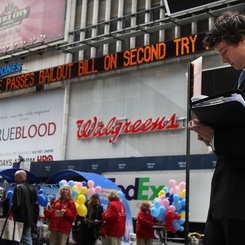The world of international financial reporting by multinational companies is steadily moving to using a single basis of accounting, International Financial Reporting Standards (IFRS). The big question for the international community is whether this movement will take in the United States: will the US abandon its much-prized Generally Accepted Accounting Principles (GAAP) in favour of IFRS? The answer currently seems to be ‘No’, or at best only slightly.
The Securities and Exchange Commission (SEC) which is responsible for specifying the reporting regime for companies issuing securities on the US capital market has long been a supporter of IFRS, but as different SEC chairmen have come and gone, and different Chief Accountants, enthusiasm has waxed and waned.
SEC chairmen tend to come and go as the President changes. President Obama’s nominee, Mary Schapiro, delayed a decision that under the previous administration had seemed imminent. She mandated a staff report into the advantages and disadvantages of moving to IFRS. This report, expected at the end of 2011, finally surfaced in July 2012, but it made no recommendations.
The best guide to what to expect comes from what James Kroeker, the chief accountant of the SEC until July, told influential members of the international financial reporting community that the final decision must be made by the SEC, but the likelihood, if they move at all, would be:
(a) The US maintains the ‘US GAAP’ label
(b) The US private sector standard-setter, the Financial Accounting Standards Board (FASB) will be in charge of assessing individual standards, and may modify them for US use
(c) There will be a five to seven year transition period
Mr Kroeker added that the present ‘convergence’ programme where the US and international standard-setters work on joint projects such as leasing and revenue recognition must come to an end. He imagined that in the near future the international standard-setter would create some sort of forum whereby public authorities responsible for national and regional endorsement would regularly meet together. The International Accounting Standards Board (IASB) should involve this forum in the development of standards to reduce the risk of subsequent ‘carve-outs’ from IFRS.
Mr Kroeker was speaking in London to a meeting of the IFRS Advisory Council, a body which brings together many interests form the world of international financial reporting to discuss the work of the IASB. He apologised for the delay in finalising the SEC assessment, and explained that the Dodd-Franks Act in the US had occupied a lot of staff time, while the IASB and FASB had also not completed the convergence projects originally scheduled for the middle of 2011.
The prevailing view in the international financial reporting community now seems to be that no decision will be made by the SEC ahead of the next President of the US taking office next year. Clearly there will be no outright endorsement of IFRS, and what might be expected is a slow narrowing of differences, with the US taking much less of a prominent role in the development of IFRS. Many US companies see little advantage in moving to IFRS.
If the SEC did set up a formal endorsement programme it remains an open question as to what sort of threshold the FASB would use to determine if they endorse an IFRS. The SEC has previously suggested that the IFRS must be an improvement on US GAAP, otherwise it would not be endorsed. However, this raises the question of whether the FASB would endorse an IFRS that was as good as a US standard but took a different alternative amongst an equally valid group. Would the FASB endorse that?
The European Union does, of course, have a similar endorsement mechanism, but the EU committee can only delete things from an IFRS, they cannot add things, and they have so far made only one carve-out. If the US goes ahead with this kind of arrangement, it will cause some Europeans at least to wonder if they should not also call IFRS ‘European GAAP’ and adapt them freely.









